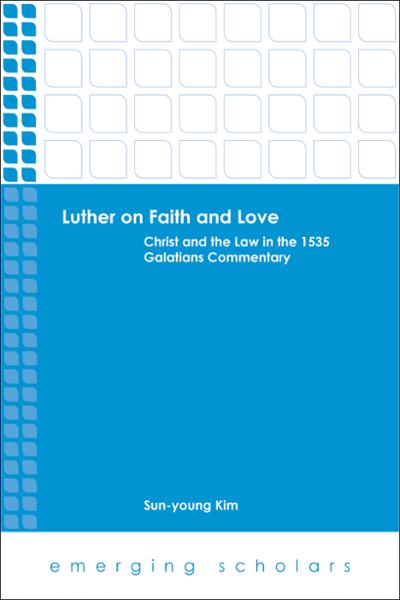There has been a distinct tendency in modern scholarship to underestimate Luther’s teaching on love by overemphasizing his teaching on justification. Calling this tendency into question, Sun-young Kim advances the thesis that Luther’s teaching on faith and love operates as the overriding thematic pair in the dynamics of Christ and the law—structurally and conceptually undergirding the 1535 Galatians commentary. The research situates itself in the landscape of Luther scholarship via a special attention to Finnish Luther scholars and scholarship.
Luther on Faith and Love argues that in the discussion of proper righteousness and holiness, Luther’s redefined love emerges in harmony with faith. His views on Christian freedom, the Christ-given law of love, the twofold way of fulfilling the law, and his Christological premises demonstrate the logical rationale for reintroducing love. This love, designated as a fruit of faith, is incarnated in three major relations: love toward God, toward others, and toward self.
Luther on Faith and Love argues that in the discussion of proper righteousness and holiness, Luther’s redefined love emerges in harmony with faith. His views on Christian freedom, the Christ-given law of love, the twofold way of fulfilling the law, and his Christological premises demonstrate the logical rationale for reintroducing love. This love, designated as a fruit of faith, is incarnated in three major relations: love toward God, toward others, and toward self.
- Format Paperback
- ISBN 9781451487725
- eBook ISBN 9781451489767
- Pages 256
- Emerging Scholars category Christian History
- Dimensions 6 x 9
- Publication Date October 1, 2014
Contents
Contents:
Introduction
1. Research on Faith and Love in Luther
2. Faith and Love in the Dimension of Passive Righteousness and Holiness
3. Faith: Sole Means of Grasping Christ
4. Faith and Love in the Dimension of Active Righteousness and Holiness
5. Love: Means of Authenticating Faith
Conclusion
Bibliography
Indexes
Introduction
1. Research on Faith and Love in Luther
2. Faith and Love in the Dimension of Passive Righteousness and Holiness
3. Faith: Sole Means of Grasping Christ
4. Faith and Love in the Dimension of Active Righteousness and Holiness
5. Love: Means of Authenticating Faith
Conclusion
Bibliography
Indexes
Endorsements
"Sun-young Kim has written a clear, thorough, and illuminating study of Martin Luther's teaching on the relationship of justification by faith alone (passive and alien) to the Christian life of love and good works (active and progressive). No one who reads this book can ever claim that Luther’s uncompromising commitment to justification by faith alone means that he embraced a life of moral indifference. The footnotes not only provide rich documentation from Luther’s writings but also substantial additions to Kim’s argument. A study not to be missed."
—David C. Steinmetz
Kearns Distinguished Professor Emeritus of the History of Christianity
Duke Divinity School
"Dr. Kim has brought an exciting new voice to the vital and vexed issue of the relationship of faith and love in Luther’s theology. Through a careful exploration of the reformer’s commentary on Galatians, in conversation with his historical context and modern interpreters, Kim’s nuanced investigation offers a subtly complex development of how justifying faith is defining for Luther and yet is structurally related to love in the working out of Christian life. Yet with all its fine detail, the fruit of Kim’s work can be stated very simply: 'The question of how sinners are justified is not separated from the question why they are justified.' The conversation is not ended, but it has been enriched by the challenging new perspective of this fine young scholar."
—Elsie Anne McKee
Princeton Theological Seminary
—David C. Steinmetz
Kearns Distinguished Professor Emeritus of the History of Christianity
Duke Divinity School
"Dr. Kim has brought an exciting new voice to the vital and vexed issue of the relationship of faith and love in Luther’s theology. Through a careful exploration of the reformer’s commentary on Galatians, in conversation with his historical context and modern interpreters, Kim’s nuanced investigation offers a subtly complex development of how justifying faith is defining for Luther and yet is structurally related to love in the working out of Christian life. Yet with all its fine detail, the fruit of Kim’s work can be stated very simply: 'The question of how sinners are justified is not separated from the question why they are justified.' The conversation is not ended, but it has been enriched by the challenging new perspective of this fine young scholar."
—Elsie Anne McKee
Princeton Theological Seminary
